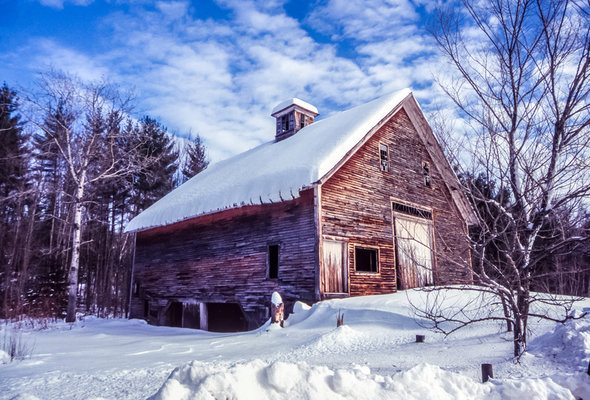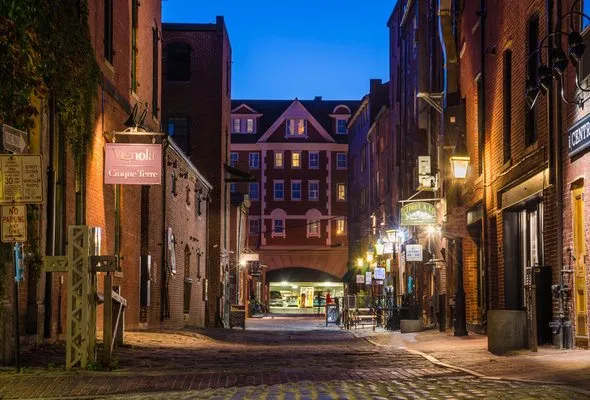Unlike most of the U.S., Maine has had a fairly flat population in recent years. New residents are barely offsetting the residents the state loses each year, though the southern half of the state is growing more quickly than the north. If you’re going to make the move to Maine, there are a number of factors you’ll want to account for. Like anywhere you could choose to live, there are both pros and cons to the state.
Before making a move, consider talking to a financial advisor on the best way to protect or grow your finances.
1. Your First Fall in Maine Will Blow Your Mind
If you’ve never experienced autumn in Maine, prepare to be amazed. The state’s fall foliage is nothing short of breathtaking, with hills, forests and coastal byways bursting into vibrant shades of red, gold and orange. From late September through mid-October, Maine transforms into a painter’s dream, drawing visitors from across the country for scenic drives, apple picking and cozy weekends in cabin country.
2. Maine’s Restaurant Scene Is Booming
Some of the most acclaimed restaurants in the country are in Portland, Maine, which is also one of the most restaurant-dense communities in the U.S. Chefs in Maine apply their considerable skill to crafting dishes out of the ingredients available in the state, including seafood, blueberries, apples and maple syrup. Moving to Maine is a great opportunity to expand your culinary horizons and try some excellent restaurants.
3. Maine Winters Can Be Harsh

The average low temperature in Portland, Maine in January is a mere 16 degrees. Heavy snowfall can mean difficult shoveling jobs, cars stuck in driveways or dicey driving conditions. If you ski, snowboard, snowshoe or ice skate, you’ll probably welcome the arrival of winter, but if you’re not a huge fan of the season, you’ll need to brace yourself for the cold, the darkness and the snow.
4. Food Shacks Are to Maine What Food Trucks Are to Other States
For casual, walk-up meals and snacks, Maine has food shacks. These are especially common in coastal communities, where they serve local delicacies like lobster rolls. If you only ever eat in sit-down restaurants, you’ll be missing out on a big part of the state’s food culture.
5. Maine’s State Cat Is the Maine Coon
Have you ever seen a picture of a Maine Coon cat? If not, it’s worth looking up immediately. Go ahead – we’ll wait. The adorable creature is the state cat of Maine, so keep an eye out for giant, fluffy cats after moving to the state.
6. Maine’s Population Is Older

Maine has a higher average age than most states. Its population skews toward the older side of the spectrum, in part because Maine is a popular retirement destination and in part because the state has had some trouble attracting younger transplants or getting its homegrown young folks to stay in the state.
7. You’ll Want to Get Your Sea Legs
Owning a boat and traveling by boat are both pretty common in Maine. That’s not to say you have to buy a boat if you move to the coast of Maine. Boats can be big money-sinks and not everyone needs one. But you may find yourself making frequent boat trips for traveling to Maine islands, sightseeing or fishing.
8. Portland, Maine Is a Gem

With its cobblestone streets, quaint waterfront and award-winning restaurants, Portland, Maine is a gem of the Northeast. Plus, Portland, Maine came in 10th in SmartAsset’s study of the Best Cities for Beer Drinkers.
9. People Live in Maine for Many Different Reasons
OK, this one may seem obvious – and of course it applies to other states, too. But Maine, though not the most diverse state in terms of language and ethnicity, is economically diverse. There are wealthy retirees in the state who settle near longtime residents who live off of each year’s lobster catch and face economic precarity.
10. You Won’t Get Tired of Acadia National Park

Acadia National Park showcases the beauty of Maine’s scenery. Hiking, biking and camping in the national park are all great ways to get into nature and see the best the state has to offer. An annual pass costs just $55, a bargain when you consider that a one-time, 7-day entrance pass is $30.
11. Even if You Don’t Live on the Coast It’s Worth a Visit
Not everyone who moves to Maine settles on the coast. Some opt for the more wild, forested inland parts of the state. But even if you buy or rent a home in an inland community, taking the time to visit coastal Maine is well worth your while.
12. Antiquing Is big in Maine
If you love antiques, you’ll love Maine. There’s even a Maine Antiques Trail that will take you to 47 different antique shops and antique malls in the state. Moving to Maine is a great opportunity to go green, buy local and stock your home with unique items by patronizing the state’s antique stores.
13. You’ll Probably See Moose
If you’ve never seen a moose, moving to Maine is your chance to change that. Maine’s moose population is the highest of any state in the lower 48 states. If you’re planning on doing a lot of walking and hiking in Maine, it’s a good idea to learn some basic moose safety.
14. Maine Wants You to Move There
As we mentioned, Maine’s population isn’t growing very quickly. That’s why the state government has partnered with some local employers to attract workers to Maine. The program, called Live and Work in Maine encourages out-of-state talent to relocate to Maine. There’s even a “Visit for a Week, Stay for a Lifetime” campaign aimed at getting Maine employers to offer vacation reimbursements to candidates they recruit for jobs in the state.
15. Yes, the Lobster Is a Big Deal

Lobster is a big part of Maine’s economy and culture. The Maine Lobster Marketing Collaborative promotes the state’s image as a producer of high-quality, sustainable lobster and touts lobster’s culinary and nutritional attributes. Even if you think you’re not a fan of lobster, it’s worth giving Maine lobster a chance.
Bottom Line
Moving to Maine means embracing a lifestyle defined by natural beauty, seasonal rhythms and a deep sense of community. From its stunning coastlines and vibrant fall colors to its small-town charm and slower pace, life here offers a refreshing change of scenery and mindset. While winters can be long and housing costs vary by region, most who make the move find that Maine’s quality of life far outweighs the challenges.
Tips for Moving to Maine
- A financial advisor can help you navigate big life changes like a cross-country move, or just help you to meet your financial goals in general. Finding a financial advisor doesn’t have to be hard. SmartAsset’s free tool matches you with vetted financial advisors who serve your area, and you can have a free introductory call with your advisor matches to decide which one you feel is right for you. If you’re ready to find an advisor who can help you achieve your financial goals, get started now.
- Before you make the move, make sure you understand how it will impact your budget. SmartAsset’s Maine paycheck calculator can help you figure out how moving to Maine will affect your take-home pay.
Photo credit: ©iStock.com/edella, ©iStock.com/johnandersonphoto, ©iStock.com/EJ-J, ©iStock.com/AlbertPego, ©iStock.com/Atlantic_Adv, ©iStock.com/Woodkern
